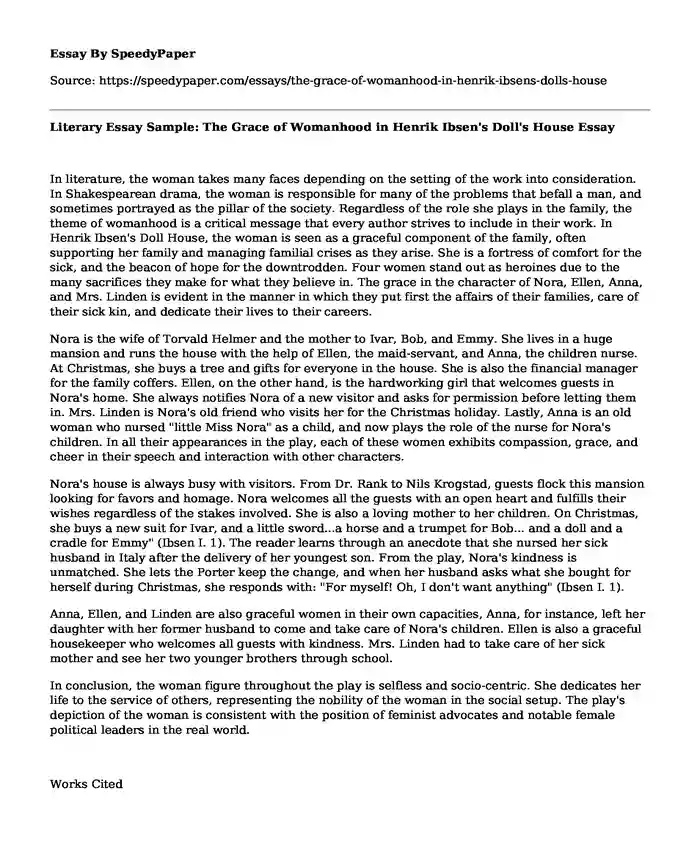In literature, the woman takes many faces depending on the setting of the work into consideration. In Shakespearean drama, the woman is responsible for many of the problems that befall a man, and sometimes portrayed as the pillar of the society. Regardless of the role she plays in the family, the theme of womanhood is a critical message that every author strives to include in their work. In Henrik Ibsen's Doll House, the woman is seen as a graceful component of the family, often supporting her family and managing familial crises as they arise. She is a fortress of comfort for the sick, and the beacon of hope for the downtrodden. Four women stand out as heroines due to the many sacrifices they make for what they believe in. The grace in the character of Nora, Ellen, Anna, and Mrs. Linden is evident in the manner in which they put first the affairs of their families, care of their sick kin, and dedicate their lives to their careers.
Nora is the wife of Torvald Helmer and the mother to Ivar, Bob, and Emmy. She lives in a huge mansion and runs the house with the help of Ellen, the maid-servant, and Anna, the children nurse. At Christmas, she buys a tree and gifts for everyone in the house. She is also the financial manager for the family coffers. Ellen, on the other hand, is the hardworking girl that welcomes guests in Nora's home. She always notifies Nora of a new visitor and asks for permission before letting them in. Mrs. Linden is Nora's old friend who visits her for the Christmas holiday. Lastly, Anna is an old woman who nursed "little Miss Nora" as a child, and now plays the role of the nurse for Nora's children. In all their appearances in the play, each of these women exhibits compassion, grace, and cheer in their speech and interaction with other characters.
Nora's house is always busy with visitors. From Dr. Rank to Nils Krogstad, guests flock this mansion looking for favors and homage. Nora welcomes all the guests with an open heart and fulfills their wishes regardless of the stakes involved. She is also a loving mother to her children. On Christmas, she buys a new suit for Ivar, and a little sword...a horse and a trumpet for Bob... and a doll and a cradle for Emmy" (Ibsen I. 1). The reader learns through an anecdote that she nursed her sick husband in Italy after the delivery of her youngest son. From the play, Nora's kindness is unmatched. She lets the Porter keep the change, and when her husband asks what she bought for herself during Christmas, she responds with: "For myself! Oh, I don't want anything" (Ibsen I. 1).
Anna, Ellen, and Linden are also graceful women in their own capacities, Anna, for instance, left her daughter with her former husband to come and take care of Nora's children. Ellen is also a graceful housekeeper who welcomes all guests with kindness. Mrs. Linden had to take care of her sick mother and see her two younger brothers through school.
In conclusion, the woman figure throughout the play is selfless and socio-centric. She dedicates her life to the service of others, representing the nobility of the woman in the social setup. The play's depiction of the woman is consistent with the position of feminist advocates and notable female political leaders in the real world.
Works Cited
Ibsen, Henrik. Doll's House. Vol. 1. Scribner & Walford, 1890.
Cite this page
Literary Essay Sample: The Grace of Womanhood in Henrik Ibsen's Doll's House. (2022, May 24). Retrieved from https://speedypaper.com/essays/the-grace-of-womanhood-in-henrik-ibsens-dolls-house
Request Removal
If you are the original author of this essay and no longer wish to have it published on the SpeedyPaper website, please click below to request its removal:
- Free Essay on Food Consumption Factors
- Philosophy Essay Example on Intellectualism and Regression
- Domtar Case Analysis, Management Essay Example
- Essay Sample: John's Case Counseling Therapy
- Essay Sample: The Idea of Ideology and Race
- Essay Sample on "The Journey of Crazy Horse: A Lakota History"
- Paper Example on Job Analysis Process and Design
Popular categories





